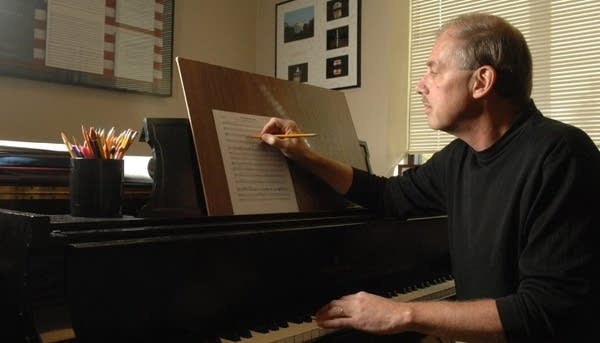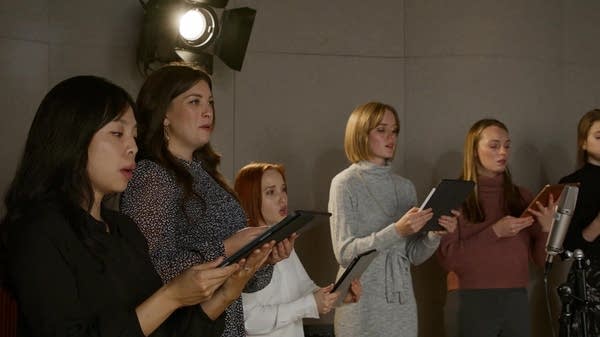Sometimes a sixth sense tells us that a particular moment is more significant than we were expecting it to be.
That happened to the Concordia Choir's conductor, René Clausen, on March 13 in Nashville, where he and the choir had just given a performance.
"I did have a kind of eerie moment of recognition when I picked up my folder after our Nashville concert — that it indeed might have been my last concert."
It was. Coronavirus was already ripping up concert schedules across the United States, and the two homecoming concerts of the Concordia Choir's 2020 tour — Clausen's last as its conductor — were canceled.
"Upon returning home, we also learned that all campus activities were canceled for the remainder of the semester," he says. "So it was a rather unusual close to a career, and for the choir also — especially the seniors."
An unusual close, perhaps. But the career itself has been prodigious — 34 years as both conductor and professor at Concordia College in Moorhead, a period in which the choir has risen to a position of national and international prominence.
It all began in 1968, when Clausen — a Minnesota native born in Faribault — was attending high school in Los Angeles, where his family was living at the time.
"My high school choral director knew that I was very interested in choral music, and suggested I attend a concert by the St. Olaf Choir at the Dorothy Chandler Pavilion," he says.
Clausen went there with a friend and was instantly smitten by what he witnessed.
"I was completely taken with the sound, precision and musicality of the choir. As a senior in high school, I only applied to St. Olaf, as it was my goal to sing in that choir."
After graduating, Clausen held positions at West Texas State University and Wichita State University, before the call to Concordia came in 1986.

Clausen was 32 at the time and inherited what he calls "a program of distinctive reputation for excellence," scrupulously developed by his predecessor, Paul J. Christiansen, over a 49-year period.
It could have been a daunting challenge. But Clausen cites some crucial advice that he was given by then-Concordia president Paul Dovre during his interview for the position.
"He mentioned that I would have big shoes to fill, and nearly without thinking I answered, 'I have big feet' — I wear size 14 shoes," Clausen says.
"His reply was most wise and comforting — "What is most important is that you bring your own shoes.' I have never forgotten those words."
Clausen's particular approach to developing the Concordia Choir's sound was that there is, as he puts it, "no specific kind of one-size-fits all 'ideal' choral sound."
It all depends, he adds, on the composer you are performing and the period he or she lived in.
"I like to think that my choir sounds differently when performing renaissance motets, a Bach motet from the baroque, or a piece from the Russian liturgical tradition," he says.
There are key principles of choral singing that Clausen likes to emphasize, however, whichever piece his choir happens to be singing.
"Pay close attention to the most subtle nuance of each word, each syllable. Love the line. Watch closely, as I might not do it the same way next time."
These are typical Clausen mantras.
So, too, is the idea that you can sing with the deepest possible emotion and still sing badly. Technique is crucially important, too.
"Head and heart in equal proportion," is how Clausen puts it. "And never louder than beautiful."

Perhaps the biggest single factor in the growing reputation of the Concordia Choir in recent years has been the ensemble's famous Christmas Concerts.
These were already in existence when Clausen arrived on campus, but in the past three decades he has taken them to a new level of spectacle and excellence.
"Adding the Concordia Orchestra allowed us to perform movements of larger works for orchestra and chorus, as well as newly composed pieces for that combination of performing forces," Clausen says.
More than 400 performers now participate in the Christmas extravaganzas, which are widely disseminated on television and carried on Classical Minnesota Public Radio. (Listen to last year's broadcast using the player above.) Their quality was nationally recognized three years ago, when Twin Cities Public Television's recording of the 2016 concert was awarded an Emmy.
As he finally steps backward from the spotlight, Clausen has plans to spend more time composing, a career he has developed in parallel with his work at Concordia over the past three decades.
"I need to write a processional for our daughter's wedding this fall," he says. "I also have a long-held interest in writing a work for the stage — probably a musical of some kind."
And looking back across the years, Clausen has no doubt that the American choral scene has changed significantly in his lifetime, and for the better.
"There are now more people singing in choirs in this country than at any other time in history," he says.
"Choral singing at nearly all levels, from public school choral programs to college and university choirs to community choirs to semiprofessional and professional choirs, is flourishing."
In Clausen's view, this has not happened by accident.
"There is a primary human need to be in community with other people, to allow our emotions, creativity and expression to have release in this ventilation of the spirit we experience when singing together," he says.
That need, he argues, has probably never been more pressing.
"In our overly digitized, overly busy, overly complex and seemingly increasingly divisive civic culture, choral singing brings a sense of compassionate community to our very souls," he says. "It is difficult to sing when you're angry."
Love the music?
Show your support by making a gift to YourClassical.
Each day, we’re here for you with thoughtful streams that set the tone for your day – not to mention the stories and programs that inspire you to new discovery and help you explore the music you love.
YourClassical is available for free, because we are listener-supported public media. Take a moment to make your gift today.









